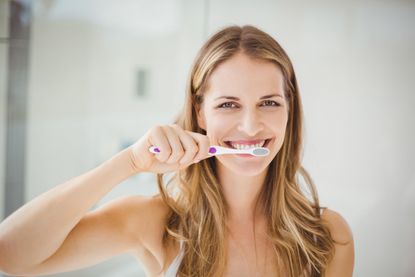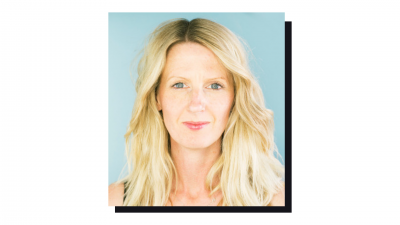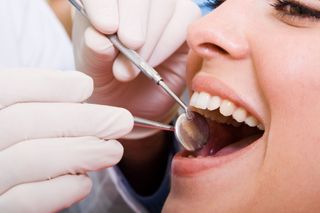Get the lowdown on your dental health with these 7 dentist-approved facts
Get clued up on your dental health. Here’s our experts' top advice for looking after your teeth.


Keep your teeth and gums in check with these top tips approved by dentists
Poor dental health not only causes tooth decay, cavities and gum disease, it’s also linked to serious conditions such as heart disease, respiratory infections, diabetes and dementia. Although it’s difficult at the moment, seeing your dentist regularly and taking on board healthy teeth tips is important.
Here’s what the oral experts want us to remember when we leave the chair after a check-up...
1. Are you going enough?
Research* reveals that adults aged 55-plus are the worst dentist dodgers, with more than 26% admitting that they haven’t been to the dentist for at least a year or more. The NHS advises that you should have a routine check-up every six months to a year, to maintain a healthy mouth, teeth and gums, and to spot potential problems before they arise.
2. Take the breath check
The biggest cause of bad breath is gum disease, says dental surgeon Dr Guy Barwell (theimplantcentre.com). ‘To tell how bad your breath smells, lick your arm, let it dry and then have a sniff,’ he says. ‘This will give an indication of any odour-producing bacteria in your mouth.’
3. Good gums
Many adults in the UK have some degree of gingivitis – commonly known as gum disease, and most people experience it at least once in their lifetime, says Dr Barwell. So, what are the common signs? ‘Your gums bleed when you brush your teeth and you may have bad breath. If gingivitis isn’t treated, a more serious condition called periodontitis can develop,’ he says.
TRY THIS! Alongside your daily oral routine, Corsodyl Treatment Mouthwash is an effective short-term solution for gum disease.
GoodtoKnow Newsletter
Parenting advice, hot topics, best buys and family finance tips delivered straight to your inbox.

4. Do you dread the dentist?
One in three Brits has lived with excruciating tooth pain due to their fear of the dentist*. This is called odontophobia and is a very real condition for many people in the UK, says Shaila Patel-Buxton, a dentist at Bupa Dental Care. ‘Some people’s fear is triggered by the sound of the drill, or thought of needles inside their mouth,’ she explains. ‘For others, it’s the loss of control, or the fear of pain that makes them feel nervous.’
Here are Shaila’s tips to work through the worry...
- Write down your feelings to help you understand more clearly what you’re afraid of.
- Download a mindfulness app that offers guided meditations, breathing exercises and relaxing music to clear the mind.
- Take a family member, or close friend, to your appointment for support. Or go to their dentist appointment - watching someone else could be key to facing your fears.
- Discuss any concerns with your dentist.
5. Check your hygiene habits
Your teeth need to be cleaned at least twice a day, says celebrity dentist Dr Richard Marques (wimpolestreetdental.com). ‘Bacteria builds up in your mouth and on the surface of the teeth throughout the day and when you sleep, so keep up a regular routine,’ he says. And consider switching to an electric toothbrush. ‘They’re more effective at removing plaque than manual brushes,’ says Dr Marques. ‘Check that your toothpaste contains fluoride as well. It makes teeth and gums more resilient to the acids and bacteria that attacks and weakens them.’
TRY THIS! Oral-B Genius X, £169.99, Boots.
6. Hormones and mouth health
Did you know that fluctuating hormones can impact dental health? Studies show that the menopause may cause burning mouth syndrome, and a dry mouth that makes you more vulnerable to sore gums and cavities. A decrease in oestrogen also increases the risk of bone loss in the jaw – a sign of this can be receding gums.

7. The super stainers
FOODS
Curries, tomato ketchup, chocolate and pasta sauces potentially stain your teeth by leaving behind their pigments. The use of artificial colourings in foods, along with the risk of plaque and bacteria trapping the pigments between teeth, means more chance of staining, says dentist Dr Deepak Aulak (draulak.com). ‘Drink water with meals and clean your teeth after eating to reduce build-up,’ he says.
DRINKS
‘Tea, coffee and wine leave chemical pigments on teeth, and fizzy drinks have a high acid content that wears down enamel, exposing the yellower dentine layer below, and affects the tooth’s strength,’ says Dr Aulak. Drink water to help neutralise acids, and use paper straws to reduce contact with your teeth.
SMOKING
Along with thousands of nasty chemicals, tar and nicotine in cigarettes severely discolour teeth. ‘Smoking also inhibits the repair of gum tissues, as well as causing bone loss and exposure of the roots of teeth,’ says Dr Aulak. ‘It impairs blood supply to the oral tissues and furthers the risk of periodontal disease. More significantly, smoking causes an increased risk of mouth, throat and lung cancer.’

DON’T FORGET TO FLOSS
Do you regularly clean in between your teeth? ‘If you don’t floss, you're missing 40% of a tooth,’ says Dr Barwell. ‘Plaque forms at the gum line between the teeth, just as much as on the surface. It’s important to clean there daily, either with floss or interdental brushes.’ - don’t worry if your gums bleed the first few times.

Senior writer Ali Horsfall has almost 15 years of experience as a journalist and has written for national print titles and women’s lifestyle brands including Woman & Home, Woman, Woman's Own, BBC magazines, Mothercare, Grazia and The Independent.
-
 Is Brandy pregnant? Bluey fans think the Heelers could be about to welcome a new cousin following the season 3 finale
Is Brandy pregnant? Bluey fans think the Heelers could be about to welcome a new cousin following the season 3 finaleEagle-eyed Bluey viewers are wondering if Aunt Brandy is pregnant, following a touching moment in the season three finale.
By Ellie Hutchings Published
-
 5 reasons why 'high-achieving women' may struggle with motherhood, according to a postpartum therapist - but we think all mums can relate
5 reasons why 'high-achieving women' may struggle with motherhood, according to a postpartum therapist - but we think all mums can relateMotherhood is a huge adjustment for any woman, but a postpartum therapist has explained five factors that make is difficult for 'high-achieving women'.
By Ellie Hutchings Published